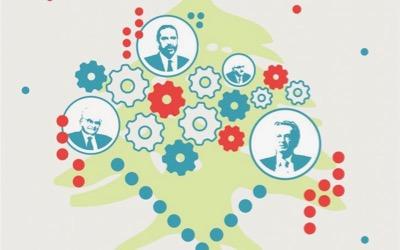Is Lebanon’s Central Bank A Ponzi Scheme?
The situation in Lebanon is deteriorating.
Traffic lanes have all been reopened, but a rift has emerged between those who favour the free flow of traffic and the road blockers.
-
The Free Patriotic Movement of President Michel Aoun, the Shiite Amal Movement of parliament speaker Nabih Berri and the Hezbollah condemn road closures;
-
while the Future Movement led by Saad Hariri, a Sunni, the Lebanese Forces of the Maronite Samir Geagea and the Progressive Socialist Party of Walid Jumblatt, leader of Lebanon’s Druze, have attempted to reintroduce the roadblocks.
In the current political landscape, pursuing a simultaneous fight against corruption does not seem possible. Gebran Bassil (Free Patriotic Movement) announced that all the leading members of his party would make public their bank accounts. He also tabled a bill aimed at verifying the assets of civil servants. However, several hurdles would render such measures unworkable (the waiver of bank secrecy being prohibited by law in these circumstances; nothing has been said about the bank accounts belonging to the family members of political leaders; etc.).
Actually, corruption in Lebanon is not a violation of the law; it is the law itself that generates it. For example, there are import taxes, which nobody pays since the law grants an exemption to the 17 recognized religious communities. It is therefore sufficient to have the import declared by a person from one of these communities to avoid paying the tax. Thus, the port of Beirut loses out on US$ 3 billion every year.
The liquidity crisis, which sparked the 17 October protest movement, has worsened. Banks only allow cash withdrawals in Lebanese pounds up to a maximum amount equivalent to US$ 500 per week. All the rating agencies (Fitch, Moody’s and Standard & Poor’s) have downgraded Lebanon’s credit rating. Lebanon’s Central Bank Governor, Riad Salamé, maintains that the country holds US$ 38 billion in foreign currency reserves, but according to Moody’s they do not exceed 5 to 10 billion. On 28 November, Lebanon paid off a Eurobond of US$ 1.5 billion but may be unable to cover the next payment. The possibility of a bail-in targeting all Lebanese bank accounts is increasingly being brought up.
The personal fortune of the Prime Minister, Saad Hariri, has come under scrutiny. As was previously reported by the Saudi press, Mr. Hariri had to reimburse astronomical sums to the Saudi state. No one seems to know what has become of that unfathomable amount of debt. A lawsuit was filed against Hariri’s personal bank to constrain it to return one billion dollars to one of its clients.
The Lebanese think tank “Triangle” regards the entire Lebanese financial system as a scam devised by the Central Bank Governor, Riad Salamé, to emulate the Ponzi scheme investment fraud. According to Sami Halabi and Jacob Boswall, the attractiveness of Lebanese banks stems from the high interest rate they offer on dollar deposits. But this rate can only be honoured provided there is a continuous flow of new deposits (see the full note below for details). A close confidant of deceased president Rafic Hariri, Riad Salamé has been at the helm of Lebanon’s Central Bank since 1993, and is universally celebrated as one of the best central bank directors. His system only works because it benefits the country’s historic warlords.
Such a system has never been observed in any other country since the Second World War, except in Albania in the 1990s. However, the scam in Albania consisted of a misappropriation of funds that benefited private companies, while in Lebanon it was designed to favour political leaders, to the detriment of taxpayers.
* * *
Tyler Durden
Sun, 12/01/2019 – 16:30
via ZeroHedge News https://ift.tt/37WErJ1 Tyler Durden
